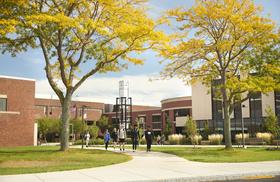Though doctors often get the glory of healing the sick, the nurses who work with them often provide most of the day-to-day care. Nurses work long hours doing thankless work and, many would agree, for less pay than they deserve. These things make many people who work in the nursing field consider returning to school for a graduate degree.
Graduate degrees in nursing are prevalent, and obtaining a degree can boost your opportunities to get a better, higher-paying job. There are, however, no guarantees. Before pursuing a graduate degree in nursing, you should closely examine the details and determine whether it is worth it.
In this article, we'll explore the details of some of the most popular graduate degrees in nursing and whether they are worth the cost. We'll also discuss how long it takes to obtain a nursing degree and how you can use community college to help get you there.
What Are the Most Popular Degrees in Nursing?
The nursing field applies to many of those who desire to help people and work in a challenging field without having to deal with the monetary or time commitment of medical school. Before you enter the nursing field, however, you should know the different degree options and what you can do with each of them.
Here is a quick list of the most common types of nursing degrees:
- Licensed Practical Nursing (LPN)
- Licensed Vocational Nursing (LVN)
- Associate of Science in Nursing
- Bachelor of Science in Nursing (BSN)
- Master of Science in Nursing (MSN)
- Doctorate in Nursing
- PhD in Nursing (Doctor of Philosophy)
As you may already know, these degrees are listed in the typical order in which they can be obtained. However, it is essential to note that there are different points at which you may be able to enter the program for a higher degree of nursing without completing all of the programs listed below. For example, you do not need to complete both an Associate of Science and a Bachelor of Science to pursue a Master of Science in Nursing.
Many nursing professionals' careers begin with a one-year program, often at community college. Licensed Practical Nursing (LPN) programs usually take a year of full-time study and can be completed at a community college, a vocational-technical school, or a hospital. An LPN is the same as a Licensed Vocational Nursing program; they have different names in California and Texas. Completing this program enables you to sit for the National Council Licensure Examination- Registered Nurse (NCLEX-RN) exam. If you want to further your education before taking the exam, you may pursue an associate's degree in nursing.
These degrees will give you a point of entry into the nursing field, but they do not necessarily guarantee the best job opportunities. If you want to advance your career, your best bet is to obtain a Bachelor of Science in Nursing rather than an LPN or Associate degree.
Once you have obtained your Bachelor of Science in Nursing or otherwise become a Registered Nurse (RN), there are several other options to pursue to advance your career. Several nursing specialties require additional schooling but not a Master's degree. Nurse anesthetists (CRNA), nurse practitioners (NP), and nursing midwives (CNM) can obtain these certifications in most states without obtaining a Master's degree. However, if you plan to specialize in an advanced field like clinical training, research, hospital administration, or public health, you'll need a Master of Science Degree first.
After you've reached the Master's degree level, there are a few more options. You can obtain a Doctor of Nursing Education or a Doctor of Nursing Practice, each requiring 3 to 5 years of study. From there, the final option is a Doctor of Philosophy or a PhD in Nursing.
This video addresses some of the frequently asked questions about nurse training.
Which Degree is Right for You?
If you want to work as a Registered Nurse, you do not need to obtain advanced degrees. An associate's degree is the minimum requirement for obtaining RN certification, though getting a bachelor's degree may give you better opportunities at the start of your career. However, after working in the field for a while, you may wonder if obtaining another degree will help you find a better job or a better wage.
At this point, you need to start thinking about the cost of obtaining another degree versus the potential benefits of doing so. The next logical step is to get an MSN.
First and foremost, you need to consider how long it will take to obtain an MSN. You also need to consider the prerequisites of being accepted into a program, the cost of that program, and the time commitment required to attend classes.
Generally speaking, MSN programs take 2 to 3 years to complete as a full-time student and up to 5 years part-time. These programs cost up to $60,000, and scholarships are not always available. For many nurses, however, employers are willing to help pay for classes, but they may require you to keep working full-time, delaying your graduation. Thinking about it practically, however, you may enjoy a pay bump up to $20,000 annually immediately after completing the program.
But what can you do with an MSN degree? Here are the top options:
- Nurse Practitioner
- Certified Nurse Anesthetist
- Clinical Nurse Specialist
- Certified Nurse Mid-Wife
- Clinical Nurse Leader
- Nurse Administrator
- Nurse Educator
- Nurse Manager
If you have your heart set on one of these job titles, you should obtain your BSN to complete a master's degree afterward. You may even be able to find an accelerated BSN program to help you get there more quickly or a Direct Entry MSN, which enables you to enter a master's program as long as you have a BSN, even if it is a non-nursing related field.
What About Nurse Practitioners?
Before you jump headlong into a Master's degree program, consider another option – a nurse practitioner program. The two programs are very similar, and you can obtain a nurse practitioner license while completing an MSN, but you can also obtain one separately.
A nurse practitioner program is designed to help graduates provide advanced clinical care to patients. In contrast, MSN programs are geared more toward those interested in management positions within the nursing field. Nurse practitioners can specialize in women's health, adult practice, family practice, geriatrics, and acute care. They are also qualified to perform physical exams, interpret X-rays, prescribe medication, and treat various medical conditions. They may also perform roles in administering health behavior counseling, mental health and illness prevention, and prenatal care.
A master's degree in nursing usually takes two years of full-time study. However, many who pursue this degree enroll in dual programs, such as a business administration concentration. This might involve taking business planning, financial management, market strategy, program development, leadership, and health systems management courses.
Simply put, if you're looking for a program to advance your career in clinical care, a nurse practitioner program might be the right choice. For a career in administration or management, get an MSN.
This video offers an overview of being a nurse practitioner.
Is the Degree Worth the Cost?
Now that you have a better idea of what nursing degrees are out there and how to advance your career with additional degrees, you may wonder whether it is worth the cost.
There was a time when a licensed nurse practitioner (NP) could obtain a Master of Science Degree in Nursing (MSN) in just two years of study, costing between $20,000 and $40,000. After graduation, they could expect to earn close to $100,000. Today, many employers seek NPs with doctorate degrees, which require an additional four years of school and double the cost of becoming an NP. Is it worth it?
A two-year program costing just $20,000 is a fantasy these days. Recent estimates show that taking an online program from a Bachelor of Science in Nursing (BSN) to a Doctor of Nursing Practice (DNP) is over $80,000. That doesn't even factor in the cost of living, annual tuition increases, and interest on undergraduate loans.
At the end of it all, a nurse practitioner with a DNP can expect to start around $96,000. That's $10k more than a nurse with an MSN degree and over $30k more than a nurse with a BSN. Compare those numbers to the median wage for a college graduate at $66,000, and things look good.
But what does it cost throughout a lifetime?
According to Student Loan Planner, becoming a certified nurse practitioner can boost your salary by over $40,000. Throughout a 40-year career, that's about $1.76 million in extra lifetime earnings. In comparison, taking out $150k in loans seems like a measly number, but you need to look at the actual cost of paying back those loans and factor in the taxes on that income. Assuming a 40% tax rate knocks you down to just over $1 million.
There are two primary options regarding loan repayment: aggressive payback and minimal payback. If you owe less than 1.5 times your income, your best bet is to throw every extra dollar at those loans until they are gone. If you owe more than twice your income, your best option is an income-driven repayment plan that keeps your payments low. You can expect to pay an additional $50k in interest by paying off your loans.
Now that you have the numbers before you, you can apply them to your situation to determine whether it makes sense for you. If you decide to pursue a higher degree, it pays to finish it as quickly as possible (and take out the least amount possible in loans) so you can start earning.
How to Use Your Community College Years to Your Advantage
Many high school seniors already seem to have their entire life mapped out. They know what college they want to attend, what degree they will obtain, and what they want to do with it. If that doesn't sound like you, spending hundreds of thousands of dollars at a private university to obtain a degree in a field you don't care about might seem crazy.
That's where community college comes in. Attending community college allows you to take as few or as many classes as you like until you figure out what you want to do with your life. Tuition is much less expensive than a traditional four-year university, and community colleges offer additional benefits such as flexible scheduling and online classes.
But can you attend community college and obtain a nursing certification?
Absolutely! Remember, there are several ways to obtain a degree that will qualify you to sit for the National Council Licensure Examination- Registered Nurse (NCLEX-RN) exam. The three main academic pathways are state universities, community colleges, and private nursing/technical schools.
What you need to know about attending community college for nursing is that you may need to complete prerequisites or an entire Associate's degree before being accepted into the nursing program. Suppose none of the community colleges near you have their nursing programs. In that case, you can still take classes to complete your prerequisites and then apply to another program (there are even online nursing programs to consider).
Before you choose this route, however, you should know what you're getting into. Because community colleges are easily accessible – often more so than traditional universities – many people assume that their nursing programs are, too. In fact, the opposite is more likely to be the case. You can enroll easily in the community college, but competition is fierce to enter the nursing program. There are a limited number of positions, and you'll need to maintain a certain GPA for admission. Even then, you may be on a waiting list if you get in.
If you plan to attend community college to obtain an associate's degree in nursing, you should be prepared to give it your full attention. If you can't prioritize schooling in your life, you may not perform well enough to get into the program of your choice, and it will affect your future opportunities.
Tips for Success in Nursing School
Nursing is a wonderful career, but you'll never enjoy success if you don't make it through nursing school. Nursing school is just as difficult as any other degree, and you'll need to put your all into it if you want to graduate and get a good job.
Here are some simple tips for success in nursing school:
- Choose a method of organization and stick to it. Nursing school places many demands on your time, from attending class, shadowing, studying, and more. Pick your preferred method of organization (e.g., a digital planner) and stick to it.
- Take advantage of your clinical experiences. Reading about a procedure in a book is one thing, but most of what you learn about nursing will be from observation and hands-on experience. Make the most of every clinical experience you have.
- Use the resources available to you. Nursing school is difficult, but there are plenty of options for help. Use your counselor's advice to plan your schedule and take advantage of free resources on campus and online.
- Come up with a study plan that works for you. The first step is attending class and taking detailed notes – this is important for learning and helps you figure out what to study for the test. Review your notes daily and make time to check daily as well.
- Make connections with other students. Nursing school takes a lot of time, but don't forget the importance of connecting with other students. Create a study group with people in your class to swap notes, study for tests, and generally be a source of support for each other.
- Don't forget to make sleep a priority. Sleep will be a luxury when you're working as a nurse, so prioritize it while you still can. If you keep yourself organized, you'll have time to complete your schoolwork and study while getting 7 hours of sleep per night. Remember, sleep deprivation will only make your job harder, so do yourself a favor and sleep instead of spending all your time cramming.
How well you do in nursing school will directly reflect your commitment and passion for the work. If you can't force yourself to study and learn the material, nursing probably isn't your best career choice. Similarly, if you're not willing to commit to completing the degree, you won't find a career in nursing any easier.
If you want to enjoy a successful career in nursing, do yourself a favor, choose the quickest path to meet your goals and commit yourself fully to the task. When you take your first paycheck to the bank, you'll be glad you put in the effort and enjoy a successful career for many years to come.
Questions? Contact us on Facebook. @communitycollegereview














